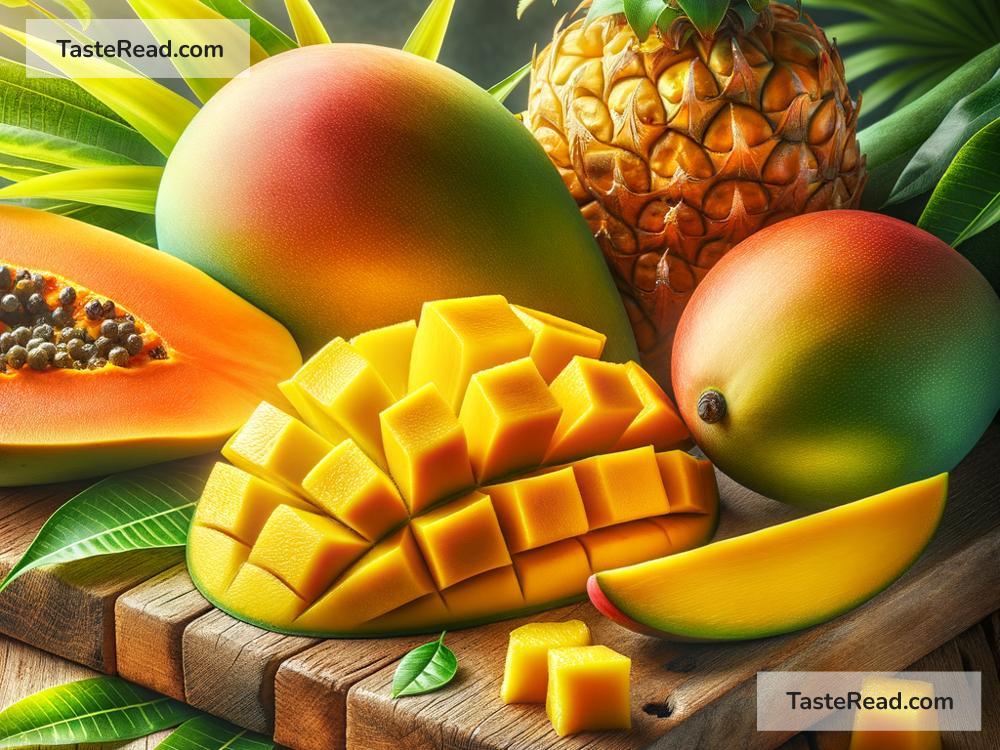Why Fruits Like Mango Have a Tropical Aroma
Have you ever sliced open a ripe mango and been greeted by its sweet, fragrant aroma? It’s the smell that instantly transports you to sunny beaches and warm tropics. Fruits like mangoes have a unique tropical scent that many people adore, but have you ever wondered why they smell like that? What’s behind their enticing fragrance? Let’s dive into the science and nature of tropical fruit aromas in simple terms.
What Is Aroma, Anyway?
Before understanding why mangoes smell tropical, let’s talk about what aroma actually is. Aromas are smells created by tiny natural chemicals called volatile compounds. These compounds are released into the air, and when we breathe them in, our nose detects them and sends signals to the brain. That’s how we perceive different scents.
Fruits release specific volatile compounds, and the combination of these chemicals creates the fruit’s unique smell. So, when you sniff a mango, you’re actually detecting a mixture of natural chemicals working together to produce its tropical scent.
Why Does Mango Smell Tropical?
Mangoes smell tropical because of the specific volatile compounds they contain. Some of the key compounds responsible for their aroma include:
-
Terpenes: These are natural chemicals found in plants and fruits. Mangoes have terpenes like myrcene and limonene, which give them their sweet, fruity, and citrus-like scent.
-
Esters: Mangoes also contain esters like ethyl butanoate and methyl benzoate. Esters are famous for creating fruity smells, and they contribute to the mango’s juicy and tropical aroma.
-
Lactones: These compounds provide the creamy undertones in mangoes’ scent. They make the fruit smell rich and smooth, adding to its tropical vibe.
The combination of these compounds creates the unique tropical smell we associate with mangoes. It’s sweet, fruity, and even slightly floral—just like a trip to an island paradise.
But Why Do Mangoes Produce These Smells?
Now that we know what causes the tropical aroma, let’s explore why mangoes produce these scents in the first place. The answer lies in nature’s genius design!
Fruits produce pleasant smells for a very important reason: to attract animals and insects. When a mango is ripe and ready to eat, it releases its sweet aroma to signal to animals (like birds, monkeys, or humans) that it’s juicy and delicious. Animals eat the fruit, and in doing so, they help spread the mango’s seeds. This helps the mango plant grow more trees in different areas. So, the tropical scent of mangoes is essentially nature’s way of ensuring its survival.
Why Do We Associate Mangoes with the Tropics?
The reason mangoes smell “tropical” also ties into where they grow. Mangoes are native to warm climates, such as South Asia and tropical and subtropical regions. They thrive in sunny, humid weather and are commonly grown in places like India, Thailand, Mexico, and the Caribbean. Because mangoes grow in tropical areas, their aroma has become associated with warm, sunny environments.
Other tropical fruits, like pineapples and papayas, also produce aromatic compounds that smell sweet and refreshing, creating a similar tropical vibe. When we encounter these scents, they remind us of vacation, relaxation, and tropical islands—even if we’re nowhere near one.
Why Do Some Mangoes Smell Stronger Than Others?
If you’ve eaten mangoes from different places, you might have noticed that some smell more fragrant than others. This happens because different varieties of mangoes have slightly different levels of volatile compounds. For example, Alphonso mangoes are prized for their strong, sweet aroma, while Tommy Atkins mangoes have a milder scent. The growing conditions—such as soil, climate, and ripeness—can also affect how much fragrance the mango releases.
Other Fruits with Tropical Aromas
Mangoes aren’t the only fruits with tropical scents! Many fruits like coconuts, passion fruits, pineapples, and guavas have scents that remind us of the tropics. These fruits also contain similar volatile compounds, such as terpenes and esters, which give them their fruity, exotic aromas.
Just like mangoes, these fruits use their aromas to attract animals and insects for seed dispersal. The diversity of scents and flavors in tropical fruits makes them irresistible to both humans and animals.
Why Do We Love Tropical Aromas?
Tropical aromas make us feel good because of their association with happy memories and comforting environments. When we smell a ripe mango or fresh pineapple, we often think of vacations, sunny beaches, or relaxing afternoons. These scents have a way of boosting our mood and making us feel refreshed.
Interestingly, many perfumes and air fresheners recreate tropical fruit scents because people find them uplifting. The aroma of mangoes and other tropical fruits is a little reminder of paradise, whether you’re enjoying them in the middle of winter or during the summer.
Conclusion
Mangoes and other tropical fruits smell so amazing because of the tiny natural chemicals they produce. Their aromas are not only a treat for our senses but also play an important role in nature by attracting animals and helping plants survive. These scents remind us of sunny beaches, tropical adventures, and relaxing moments, which is why they’re so beloved around the world.
So, next time you take a bite of a juicy mango, appreciate its tropical aroma—it’s nature at its finest!


